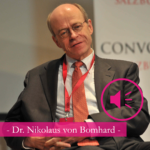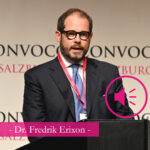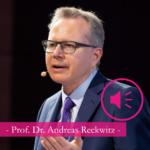Wer den C! Podcast regelmäßig hört, weiß, dass wir unseren Gästen oft die Frage stellen:
Wie wird die Welt in fünf bzw. zehn Jahren aussehen?
Lesen Sie hier die Prognosen unserer Denkerinnen und Denker:

Mein Gefühl sagt mir, dass die relativ starke Entwicklung der Autokratien den Zenit überschritten hat. Ich glaube, dass sich die Zivilgesellschaften in Ländern wie China, Türkei, Iran und Ungarn neuformieren. Das heißt nicht, dass man sich dort auf ein System westlicher parlamentarischer Demokratie mit seinen Schwächen einschränken muss, aber ich denke, dass der extreme Erfolg der Autokratien in der Öffentlichkeit sich seinem Ende entgegen neigt … Der Präsident in China bekommt zwar eine dritte Amtszeit, aber ich bezweifle stark, dass er auch eine vierte bekommt. Im Land hat sich inzwischen aus verschiedenen Gründen viel zu viel Widerstand aufgebaut. (25.10.22)
Nikolaus von Bomhard ist seit vielen Jahren in der Unternehmenswelt der Assekuranz tätig.

Ich sehe das Risiko, dass wir wieder zurückfallen in eine Welt geteilt zwischen Staaten mit einem autokratischen Modell und Staaten mit einem liberal marktwirtschaftlichen Modell. Wir müssen in der liberalen Welt kollektiv darüber nachdenken, wie wir unsere Welt verteidigen können. (25.11.22)
Cornelia Woll ist Präsidentin der Hertie School in Berlin.

China’s going to be roughly the same as it is right now. Authoritarianism is going to increase. The ability of Western companies or citizens to work together with China will have been reduced further, and the same will be true for the ability of European researchers and scholars to collaborate with universities and scholars in China. I really don’t see China and the Western World moving towards a policy of compromise on institutions, policies, and other issues. (09.06.22)
Fredrik Erixon ist Direktor des European Center for International Political Economy (ECIPE) in Brüssel.

Meine größte Befürchtung ist, dass wir in zehn Jahren vor einer Welt stehen, in der wieder Interessenssphären und nicht Regeln die Politik bestimmen. Das heißt, dass China, Indien, die USA und Europa in ihren jeweiligen Regionen nach eigenen Regeln operieren. Und wenn diese Zentren aufeinandertreffen, wird es vor allen Dingen um Macht und Einfluss gehen. Das wäre eine Ordnung, in der eben vor allem materiale Macht entscheidend ist und Konflikte vorprogrammiert sind. (04.06.23)
Nicole Deitelhoff ist Leiterin des Leibniz Institut Hessische Friedens- und Konfliktforschung in Frankfurt.
Politik & Gesellschaft

I don’t have faith in our political leaders to create a sense of global community or to tackle our shared global challenges in the way we hope. The silver lining is that we will see a more defined role for the non-state actor – whether it’s the youth activist, citizen activist, or billionaire activist. There’s also been a proliferation of social entrepreneurs who are trying to leverage their businesses to fix problems that governments have failed to tackle. Our progress will come from these types of actors outside of government. (09.02.22)
Maha Aziz ist außerordentliche Professorin für Global Risk & Prediction an der New York University

Meine These ist, dass wir in fünf Jahren deutlich mehr über öffentliche Güter reden werden, also über das, was wir in Gesellschaften für alle gewährleisten müssen. Ich denke, wir werden auch darüber reden, dass es dafür öffentliche Institutionen braucht, und nicht immer annehmen, dass der private Markt und irgendwelche unsichtbaren Mechanismen alles lösen können. (10.11.22)
Carsten Brosda ist Senator für Kultur und Medien in Hamburg.
Klima & Energiewende

Ich sehe im Augenblick keinerlei Entwicklung zu einer ökologischen Transformation unserer Gesellschaften. Wenn sich da nicht grundlegend etwas ändert, werden sich die Krisen in den nächsten fünf Jahren weiter zuspitzen. Die Folgen einer ökologischen Krise sind ökonomische und soziale Krisen. Wenn wir uns nicht ändern, sind meine Aussicht für die nächsten fünf Jahre daher nicht sehr optimistisch. (09.02.23)
Jens Kersten ist Professor für Öffentliches Recht und Verwaltungswissenschaften an der LMU München.

Ich vermute, dass die Auseinandersetzung mit dem Klimawandel eine Normalisierung erfahren wird. Klimapolitik wird zum Normalfall, jedenfalls in Europa. Sie ist nicht mehr umstritten, sondern wird pragmatisch vorangetrieben. (11.03.22)
Andreas Reckwitz ist Professor für Allgemeine Soziologie und Kultursoziologie an der Humboldt-Universität zu Berlin.
Technologie

I am excited about the potential of technology to make the world a more equal place. For example, today in the US a blind person can take his blind partner out to dinner by using a driverless car. Even ten years ago that was science fiction. These advancements in technology will help the disabled to be more independent and more included in the able-bodied world over the next five years. (07.03.23)
Hein Wagner ist Diversity, Equity and Inclusion Ambassador für Beaumont.

In the next five to ten years, I would not expect any dramatic transformations. But in the context of 50 to 100 years, I can envision changes due to developments in the medical field and in artificial intelligence that will somehow increase the human life span and cognition tremendously, consequently generating prosperity in a way we cannot envision. (16.09.22)
Oded Galor is Professor für Wirtschaftswissenschaften an der Brown Univversity, US.

I’m an inveterate enthusiast for futurology, and like many people I am very excited by artificial intelligence. Human beings invent tools to compensate for things we can’t do. That’s why we’ve invented ploughs, airplanes, calculators etc. And one of the things we can’t do very well is think properly. Therefore, to raise the level of intelligence would be terrific. My dream for artificial intelligence is for all of us to have an AI guru who would know and guide us. This AI would use information we have willingly provided to guide us to make optimal choices, not only in banal things like what to eat for dinner and how to exercise, but also deeper things like how to manage one’s relationships and what to say to one’s children. My hope is that the wisdom of the crowd, the totality of millions of experiences, will be brought to bear on our individual domestic lives. (26.01.23)
Alain de Botton ist Schriftsteller und Philosoph.

10 years ago, Trent McConaghy and I talked about a future where humans could upload the sum total of our essence – our human experience, our learnings, our wisdom – into the cloud. And this essence could eventually be re-instantiated later, downloaded into some sort of biological vessel capable of surviving on a foreign planet with an atmosphere hostile to humans. I don’t think that’s 10 years away, but I believe this is where humanity is heading – a multi-planetary species, inseparable from the AI that we’re building, using cryptocurrency and blockchain as a substrate for all economic transactions, and aiming ever more towards the stars while maintaining our humanity. (18.6.23)
Bruce Pon ist Gründer von Ocean Protocol.


